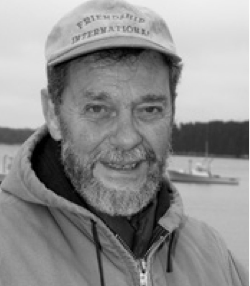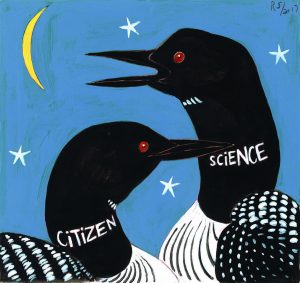Citizen Science and Maine’s Fishermen: An Enlightened Approach to the Search for Ecological Solution
by Ted Ames
As a retired commercial fisherman— in addition to being a researcher and volunteer—I have a particular interest in how the shoreside world perceives fishermen, especially because we are often portrayed as frustrated antagonists of management and oppositional to enviros.” Fishermen’s participation in science, however, has the potential to change that perception. Are fishermen volunteering to participate in studies affecting their fisheries for the common good? What are the obstacles to their participation in citizen science, particularly when it could provide important information on how to improve their own fisheries? How might their participation in science provide valuable insights into the marine world in a changing climate?
Citizen science is often defined as science done by ordinary people who often work for, or with the help of, scientists to answer real-world questions. This potentially large source of labor has become increasingly important to scientists and regulators as they struggle to fund and staff projects dealing with environmental issues. Because the need for volunteers is so great, the federal government and state of Maine have developed policies for attracting interested citizens to help with relevant studies.
Some researchers and agencies actively solicit interested individuals to participate. Topics vary from health and social services to astronomy and numerous environmental studies. Volunteers are the extra hands and eyes that collect samples, monitor projects, and restore degraded habitats. Timely monitoring by volunteers in environmental studies, for example, has allowed identification of air pollutants and noncompliant sewage discharges into aquatic and marine systems in coastal Maine. However, volunteers are often not limited to these activities. In an analysis of recruitment and retention of citizen volunteers, West and Pateman (2016) listed the potential activities of volunteers as including project design, hypothesis formation, processing, distributing data, and communications. Perhaps the most distinguishing features of volunteers, however, are that they are unpaid, and of their own free will, are engaging in projects for outcomes that benefit others.
OBSTACLES TO CITIZEN SCIENCE IN COMMERCIAL FISHERIES
At first glance, it seems obvious to link fishermen volunteers with scientists working to understand marine and aquatic systems and develop sustainable fisheries, creating unique opportunities for both. Scientists require vessel platforms and intimate information about the areas and species they wish to study, while fishermen have sturdy, seaworthy boats and know the areas they fish like their backyards. Researchers are trained to study the dynamics controlling their fishery’s productivity, but have limited time and resources to conduct extensive field studies. Seasonal survey cruises aboard dedicated research vessels provide one tool, but ship time is expensive and sampling is inherently limited to brief periods and relatively few sites, leaving large gaps. Fishermen know little about early life stages of the species they encounter, or the processes affecting their abundance, but they do know where the adults and larger juveniles of their target species are found at different times of year and their boats make ideal work platforms.
However, coastal commercial fishermen differ from most citizen volunteers in two important ways that helps explain the challenges posed to them by this type of citizen science. Most citizen volunteers are indulging in a hobby, expressing their concern about an issue, or simply curious about a subject area quite removed from their expertise or actual employment. In contrast, day-boat fishermen, such as Maine lobstermen, are working when they are on the water. Any research activity that differs from their normal fishing routine carries an opportunity cost that cannot be recovered: in fact, the income from a lost day of fishing is gone forever.
Collaborative research, as it’s called on the water, requires such things as meshing the fisherman’s schedule with the shoreside availability of researchers. Research activities interfere with the rhythm and location of fishing. The second difference is that fishermen make their living based on their knowledge of the marine environment where they fish, so the information they are sharing with scientists is inherently proprietary. Although they may want to help out, the specter of having to share information directly related to their livelihood is threatening and makes many fishermen reluctant to get involved. Knowledge is a tool of their trade in a competitive business. Today, as electronics have made idiosyncratic knowledge less valuable, this issue has become less of an absolute barrier to collaboration.
EMERGENCE AND IMPORTANCE
Increase in the number of commercial fishermen who volunteer to work with scientists is linked to dramatic changes occurring in the ecosystems and a growing awareness by both groups that their collaboration holds promise for more sustainable fisheries and important learning about how future trends may affect fisheries. The results of projects where commercial fishermen have already collaborated with scientists are impressive.
For several decades, Atlantic herring distribution along the Maine coast has been studied using fishermen participation to better coordinate spawning closures with fishing practices to ensure a future fishery for herring while maintaining adequate prey abundance for other species.
In the 1990s, Maine lobstermen initiated a voluntary one-week count of all egg-bearing females caught in their traps. They were frustrated by a federal management regime that insisted that Maine’s regulations were ineffective at providing reproduction in the fishery based on an assessment model that predicted the imminent collapse of Maine’s lobster fishery. The number of gravid females counted was huge, and the effort resulted in the development of a new assessment model for Maine that recognized the fishery was healthy. Additionally, Maine’s management regulations were found to be so effective that other states adopted them.
Alewife harvesters throughout the state have joined with hunters, anglers, wildlife enthusiasts, and environmentalists to work on state and federal efforts to reopen river access for alewives and other anadromous fish that spawn in freshwater but spend their lives at sea. Local volunteers collect scale samples from alewives and count fish, a major twice-a-day commitment that is part of the science of reopening harvestable runs and ensuring access for other species.
Twenty-five years ago in an effort to save their fishery from collapse, Maine’s retired highliner coastal fishermen, who historically targeted cod and haddock, voluntarily identified sites where they had previously caught ripe (close to spawning) cod and haddock. As a result, Maine fishermen successfully supported legislation to close groundfish fishing in state waters during spawning season.
These efforts contributing to ecologically sound fisheries are what I often refer to as fishermen stewardship because their participation not only helps their particular fishery, but also enhances species diversity by facilitating the recovery of additional species.
OPPORTUNITY
We are now in a time when coastal ecosystems are changing unpredictably. Many of the old research approaches that depended on relatively predictable ecological patterns are less useful. If we are able to set conditions to successfully engage fishermen in ongoing citizen science, we will have a cadre of observers who can provide science with invaluable, fine scale observations in real time that not only can help sustain fisheries in uncertain times, but can also provide insights into the ocean environment that is so vital to the planet. This is a vision worth working toward.
References
West, Sarah, and Rachel Pateman. 2016. “Recruiting and Retaining Participants in Citizen Science: What Can Be Learned from the Volunteering Literature?” Citizen Science: Theory and Practice 1(2): 15. DOI: http://doi.org/10.5334/cstp.8

Ted Ames is a founding board member of Penobscot East Resource Center. He fished commercially for 28 years and was vice-chair of Maine Department of Marine Resources Hatchery Technology Committee, executive director of the Maine Gillnetters Association, and director of Alden-Ames Lab. He has authored several peer-reviewed articles on historical fisheries ecology, fishermen’s ecological knowledge, and related subjects. Ames was named as a MacArthur Fellow in 2005.

